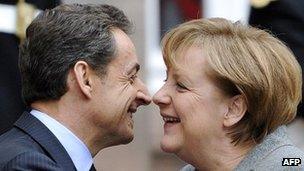Euro endgame
- Published
- comments

Despite displays of unity there are tensions in the Franco-German alliance
There is a dance of the summits. A quickening of the pace. The drumbeat louder. A certain breathless anticipation. And none more so than with this week, which ends with a summit on Thursday and Friday.
We have been here three times before this year. Always the meetings come with the assurance that this time Europe's leaders will take control of the crisis. The meetings end with slightly flushed leaders explaining their success - only for the markets, within days, to dissect their statements and come away less than convinced.
Certainly this time the rhetoric has become more strident. The French Foreign Minister, Alain Juppe, not only said this was an "existential crisis for Europe" but warned that failure threatened the peace. The Polish Foreign Minister, Radek Sikorski, said any break-up of the eurozone would be apocalyptic.
What is different with this late year-end gathering is that the eurozone leaders are contemplating big structural changes. They are finally acknowledging that the way the single currency operates is flawed and requires major surgery.
So Angela Merkel is calling for a "new phase in European integration".
Suddenly the words "fiscal union" have been dropped into the debate. The German chancellor has decided that a single currency needs monetary and fiscal union.
Budget surveillance
So the plan is to centralise control of eurozone budgets and to tightly control countries' tax and spending. Budgets will be submitted to Brussels for approval before they go to national parliaments. There will be automatic sanctions against those countries that break the rules. The German leader has spoken of offenders being hauled before the European Court of Justice.
The rules of the Stability and Growth Pact , externalwere broken more than 60 times. This time countries will be forced to comply.
These measures would take the eurozone beyond what was permitted under the existing treaties. So the Germans - with the French now on-side - have insisted on changes to the EU treaties. "We need profound treaty modifications," said Valerie Pecresse, the French government spokeswoman.
But when the French and German leaders meet in Paris they will have to iron out important differences.
President Sarkozy made it clear last week that he does not want more power to go to the unelected bureaucrats in Brussels. He would much prefer that this new structure is agreed and policed between governments. He is under pressure in France not to weaken national sovereignty by signing away powers over tax and spending or acceding to German control over French budgets.
His main opponent in the forthcoming French election, Socialist leader Francois Hollande, said pointedly that "it is Merkel who decides and Mr Sarkozy who follows". A senior Socialist, Pierre Moscovici, said of treaty change that "most of all it erodes our sovereignty". France is heading for an election where the central question will be "who governs France?"
More ECB muscle
The hope is that if Europe demonstrates it has its spending and budgets under control the European Central Bank might feel more able to intervene in the markets and help countries like Italy and Spain by lowering their borrowing costs. In very broad terms the deal is fiscal discipline in exchange for the ECB turning on the printing presses.
It is also unclear whether these changes will lead to substantive treaty change, which might trigger referenda in some countries, or be passed as a minor adjustment.
Many of they key details have to be worked out. They will take time and so will treaty changes. Even if all this is fast-tracked it will take months.
Politicians in all countries will need to persuade their electorates and parliaments that it is necessary to give up sovereignty over their national budgets.
It pays to be cautious. Even Angela Merkel accepts it will take years to find a lasting solution. Time is not on the eurozone side.
It may be that the financial markets accept there is now in sight a regime to impose strict budgetary controls. Again over time that will ensure that deficits are reduced.
Deeper malaise
What is far less clear is how debt will be brought down when there is almost zero growth across the southern European countries.
Greece, where investors will take losses of up to 50%, is a special case.
The structural reforms - like making it easier to hire and fire - that Italy will announce have a long fuse. For the moment the best that can be hoped for is that deficits are reduced across the eurozone over the next two to three years. But the debt mountains will remain.
What Germany is not willing to accept is a transfer union where it bankrolls the poorer countries. Whatever the outcome this week countries like Greece, Spain and Italy face years of austerity.
One of the major flaws in the single currency will remain the differences between the economies in the eurozone. Over time they were supposed to converge; they haven't. They have grown further apart. Almost certainly there will be crises buffeting the single currency for a long period ahead.
The other element to this package is austerity. All countries are signed up to a dramatic reduction in spending. We already know that the new government in Italy will take on pension reform. These cuts could easily trigger social tension. For Europe is being asked to confront an often-disguised truth: that it can no longer afford the social welfare model it has been building for more than 30 to 40 years.
So it pays to be cautious.